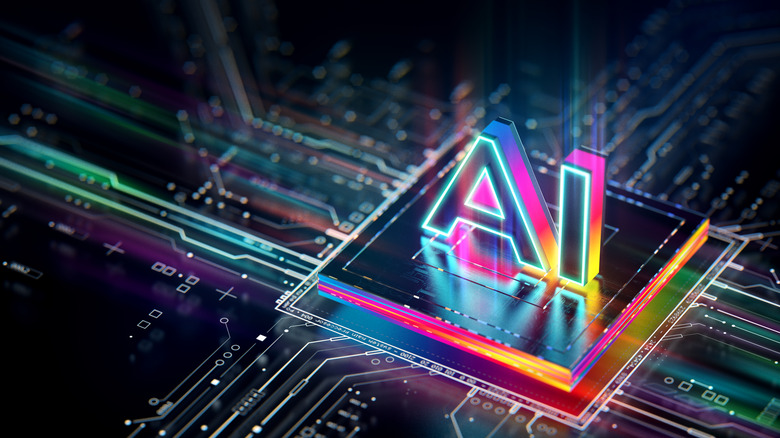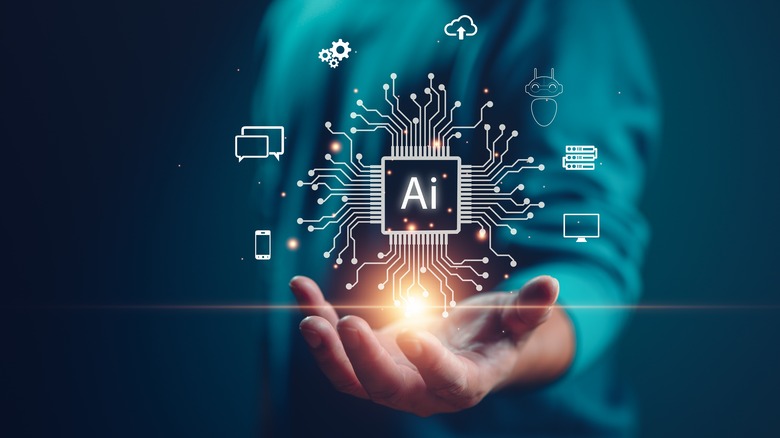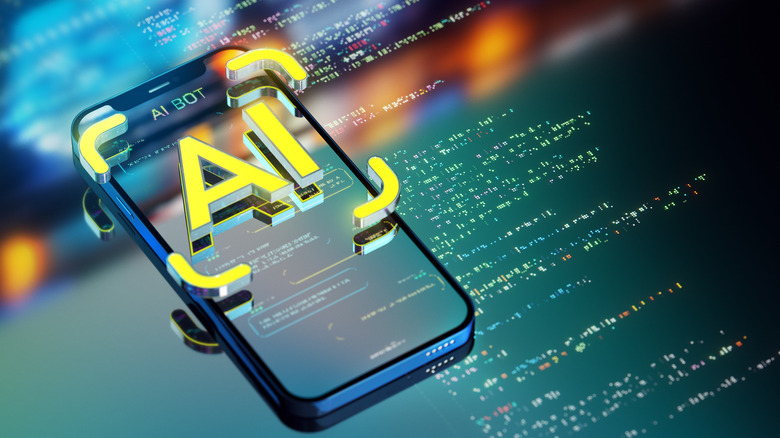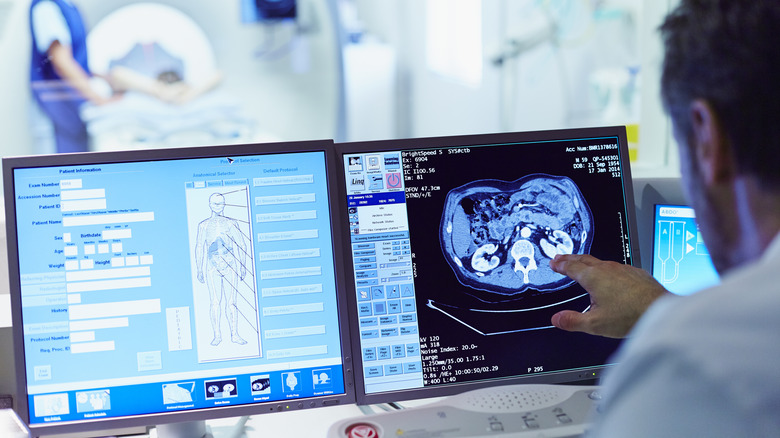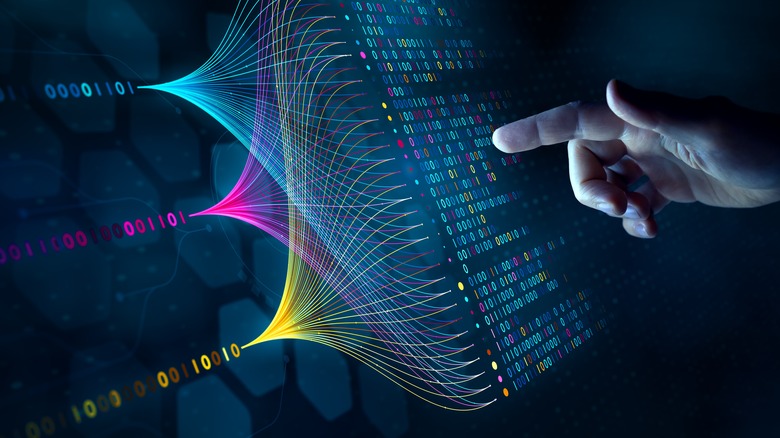Is AI The Future Or Just Passing Hype? An Expert Explains
Over the past year, artificial intelligence has rapidly advanced from being a passing curiosity to being one of the most contentiously talked about topics in the world. However, that discussion doesn't necessarily make something earth-shattering. Over time, there's been plenty of heated discussion over new technologies that were set to revolutionize the world. What the vast majority of those technologies have in common is that they didn't.
With all of the hype around AI, it is important to ask whether or not there's actual substance to all of the potential behind the technology. Is AI actually the future, or will it be the topic of mockery in just a few years in the same way NFTs are now? Even if AI is a technology that's here to stay, what does a future centered around AI even look like?
The allure of AI lies in its ability to process vast amounts of data, identify patterns, and learn from experiences. From self-driving cars to natural language processing, AI applications span a wide spectrum, touching nearly every aspect of our lives. Yet, amidst the excitement and anticipation, skepticism abounds. The conversation around AI extends beyond its technical aspects to encompass ethical considerations, societal implications, and the potential for job displacement. As AI becomes increasingly integrated into our daily lives, questions about privacy, bias, and the overall impact on the workforce demand thoughtful examination.
As businesses and individuals increasingly integrate AI into their operations and daily lives, the question looms larger than ever: is it worth the hype? To get a better idea of AI and its current place in our world and our future, SlashGear spoke to Anar Mammadov, the CEO of Senpex.
Recent failed fads
The caution and apprehension that some may harbor towards AI is founded on the back of AI possibly just being another fad in the world of technology that will fade away in a couple of years. Some of the most recent examples that spring to mind are things like cryptocurrency and NFTs, both of which utilize blockchain technology.
Both fads went through enormous boom periods where they were at the peak of success, with multiple large companies beginning to shell out their own NFTs and crypto coins. Nowadays, it's not so hard to say that NFTs failed and crypto crashed. While they were widely mocked when introduced, today, you can actually see the failure of them having taken place in real-time.
Things aren't entirely different in the world of tech hardware, either. One notable example that comes to mind is the fervor surrounding the rise and fall of 3D TVs. Just a decade ago, manufacturers were aggressively marketing 3D TVs as the next frontier in home entertainment, promising an immersive viewing experience that would revolutionize how we consume content. However, the initial excitement quickly waned, and consumers found themselves grappling with uncomfortable glasses, limited content, and a general lack of enthusiasm for the added dimension.
The point in considering these fads of the past is to realize that the tech industry has plenty of duds in its past. Many people can remember countless numbers of new technologies that were going to "revolutionize" their lives that ultimately ended up as junk in a garage or lost to the sands of the internet.
AI compared to other tech fads
Bearing in mind the amazing technologies of the past, it's easy to wonder what, if anything, makes AI any different. Because as impressive as many AI implementations can be, it's not hard to imagine AI being nothing more than a hazy memory in a few years. Is there anything that puts AI in a better position to leave a radical stamp on the world?
"AI's key differentiator lies in its versatility and the real-world impact it has already demonstrated," Anar Mammadov said. "Compared to many tech fads that lack practical applications, AI has proven to enhance various industries, from healthcare to logistics. AI's ability to adapt and evolve to address complex challenges sets it apart."
This assertion underscores a crucial distinction. Unlike certain tech fads that may have dazzled with novelty but lacked tangible applications, AI has showcased a remarkable capacity to bring about substantial change across diverse sectors. Take healthcare, for instance, where AI algorithms have demonstrated prowess in diagnosing diseases, predicting patient outcomes, and even accelerating drug discovery processes. In logistics, companies like Senpex have harnessed AI to optimize delivery routes.
The adaptability of AI is a key factor contributing to its staying power. Unlike tech fads that were often one-trick ponies, AI can pivot and evolve to address evolving challenges. Its ability to learn from vast datasets, adapt to new information, and refine its processes over time positions it as a transformative force with the potential for enduring impact. AI, as it stands today, is being used for many things, and it's likely to expand into more and more fields every year. And while there has certainly been a fair share of controversy surrounding the usage of AI in the arts, there are many ways that AI can speed up and improve operations elsewhere.
Effect on the average person
As AI becomes increasingly woven into the fabric of daily life, the average person finds themselves at the intersection of fascination and trepidation. The role of AI in shaping experiences, from the services you use to the products you consume, is undeniable. However, how much of an awareness should someone have of that? Especially moving forward into a more and more AI-centric world.
"They should be aware of AI's potential," Anar Mammadov said. "While an in-depth understanding of the technology is unnecessary, having a basic awareness can help individuals make informed decisions and navigate an increasingly AI-powered world."
Unlike some technological revolutions that may have unfolded in specialized domains, AI is seeping into the mainstream, affecting how people shop, work, and interact with the world. As AI becomes more pervasive, cultivating a foundational understanding among the average person becomes paramount. Individuals need not be experts in AI, but they should possess a basic comprehension of its capabilities and implications. Such awareness empowers people to make informed decisions, whether it involves embracing AI-driven technologies or critically evaluating their impact on privacy, employment, and societal dynamics.
At its core, AI is a tool — a sophisticated one, but a tool nonetheless. Much like electricity or the internet, AI is a force that shapes the world. For the average person, this means understanding that AI is not a distant concept limited to research labs or tech giants; it is a force influencing the products and services they encounter daily. Whether it's the personalized recommendations on streaming platforms or the chatbots assisting with customer queries, AI is already an integral part of many aspects of life.
AI's major roles
The landscape of AI is one of continual expansion, with its tendrils reaching into diverse sectors and reshaping the way industries operate. Perhaps AI is not just a trend but a transformative force poised to redefine the way industries operate.
"AI's influence is poised to expand across numerous industries. In the near future, we can expect significant AI impact in healthcare (diagnosis, drug discovery), finance (risk assessment, fraud detection), manufacturing (automation and quality control), and transportation (autonomous vehicles)," Anar Mammadov said.
To appreciate the profound impact AI is set to unleash, it's essential to recognize the versatility that defines its major roles in various sectors. Unlike isolated technologies that cater to specific niches, AI can be a chameleon, adapting to the unique challenges and opportunities presented by diverse industries.
The financial sector stands out as a prime example where AI's role is becoming increasingly indispensable. Traditionally, risk assessment and fraud detection were labor-intensive processes, relying heavily on historical data and rule-based systems. However, AI's advanced algorithms can analyze vast datasets in real-time, identifying patterns and anomalies that would be nearly impossible for human analysts to discern. This not only enhances the efficiency of financial operations but also fortifies the industry against emerging threats in the form of sophisticated cybercrimes and fraudulent activities.
In the realm of manufacturing, AI is ushering in a higher standard. The traditional assembly line is being redefined by the integration of smart machines guided by AI algorithms. These machines not only streamline production processes but also contribute to unparalleled precision and consistency. Quality control, once reliant on manual inspections, is now enhanced by AI-powered systems that can detect defects with unprecedented accuracy, minimizing errors and reducing waste.
Healthcare and AI
The synergy between healthcare and AI is a compelling narrative, one that holds promise for enhancing efficiency, improving accuracy, and ultimately transforming outcomes for patients worldwide.
One of the primary ways in which AI is poised to revolutionize healthcare is through diagnostic prowess. The traditional methods of disease detection often rely on the keen eyes and expertise of medical professionals. However, AI algorithms, fueled by vast datasets and machine learning, exhibit an uncanny ability to analyze medical images and identify patterns indicative of various conditions. From detecting early signs of cancer in radiology images to pinpointing abnormalities in pathology slides, AI augments the diagnostic process, potentially leading to earlier and more accurate identification of diseases.
In the realm of personalized medicine, AI takes center stage by tailoring treatments to individual patients based on their unique genetic makeup, lifestyle, and medical history. Analyzing vast datasets of patient information, AI algorithms can identify patterns and correlations that human practitioners might overlook. This level of precision not only enhances the efficacy of treatments but also minimizes the risk of adverse reactions, marking a paradigm shift towards more targeted and personalized healthcare.
Telemedicine, an increasingly vital aspect of healthcare accessibility, is also benefiting from AI advancements. AI-driven chatbots and virtual health assistants can assist in preliminary assessments, provide information, and even schedule appointments, enhancing the efficiency of remote healthcare services. This becomes especially crucial in reaching underserved populations and improving healthcare access for those in remote or rural areas.
As with any transformative technology, the integration of AI in healthcare comes with ethical considerations and challenges. Ensuring the privacy and security of patient data, addressing biases in algorithms, and maintaining a balance between technological innovation and the human touch in healthcare delivery are vital aspects that demand careful consideration.
AI-piloted vehicles
The era of AI-piloted vehicles, often synonymous with the concept of autonomous or self-driving cars, represents a seismic shift in how we perceive and interact with transportation. As mentioned by Anar Mammadov, we can expect a "significant impact" concerning AI's impact in the realm of transportation.
The journey toward AI-piloted vehicles is a convergence of cutting-edge technologies, including machine learning, computer vision, and sensor technology. These vehicles leverage AI algorithms to interpret and respond to the complex environment around them, transforming the act of driving from a manual task to an automated and intelligent process.
One of the primary promises of AI-piloted vehicles is the potential to enhance road safety. Human error, often a contributing factor in accidents, can be mitigated through the precision and constant vigilance of AI systems. These vehicles are equipped with an array of sensors, such as cameras, radar, and LiDAR, allowing them to perceive their surroundings with a level of accuracy and speed that surpasses human capabilities. This heightened situational awareness holds the potential to significantly reduce the number of accidents caused by factors like distracted driving or impaired judgment.
And all of that is before we get into the potential gains of accessibility in the world of transportation. The deployment of AI-piloted vehicles, however, is not without its challenges. Ethical considerations, regulatory frameworks, and the need for robust cybersecurity measures are critical aspects that demand careful attention. The era of AI-piloted vehicles represents a transformative chapter in the evolution of transportation. The fusion of AI technologies with mobility has the potential to redefine safety standards, enhance accessibility, and revolutionize the way we move from one place to another.
Consumer business and AI
The integration of AI is not merely a trend; it's a strategic imperative that has the potential to reshape how businesses operate, interact with customers, and stay competitive in an increasingly digital world.
"AI will be widely used by major consumer businesses in the future. As it continues to demonstrate its potential to increase efficiency, reduce costs, and improve customer experiences, it will become a staple across industries," Anar Mammadov said. "Those businesses that don't embrace AI may struggle to remain competitive; they will miss out on the many advantages it offers."
The future of consumer businesses is intricately tied to their ability to harness the power of AI in innovative ways. One of the primary arenas where AI is making significant inroads is in enhancing customer experiences. From personalized recommendations on e-commerce platforms to chatbots providing instant customer support, AI can create seamless and tailored interactions. This not only improves customer satisfaction but also fosters brand loyalty in an era where consumers seek personalized and efficient services.
Efficiency and cost reduction are foundational pillars of sustainable business operations, and AI proves to be a formidable ally in this regard. Through automation and data-driven insights, AI streamlines processes, optimizing everything from supply chain management to inventory control. This results in reduced operational costs, enhanced productivity, and the ability to adapt swiftly to market dynamics, providing businesses with a competitive edge.
While the advantages of embracing AI in consumer businesses are evident, it's crucial to acknowledge the challenges and ethical considerations that come with its implementation. Data privacy, algorithmic biases, and the responsible use of AI technologies are critical aspects that demand careful attention. As consumer businesses navigate the AI landscape, a commitment to ethical practices and transparency becomes integral in building and maintaining trust with customers.
Presence in daily life
The seamless integration of AI into daily life is no longer a speculative notion; it's a tangible reality reshaping the routines of the average person. From the moment one wakes up to the time they retire for the night, AI has become an invisible yet omnipresent force, influencing and optimizing various facets of their day.
In the morning, as the alarm rings, AI algorithms may have already assessed your sleep patterns and determined the optimal time to wake you up, ensuring a more refreshed start to the day. As you grab your smartphone, AI-driven virtual assistants stand ready to provide weather updates, traffic conditions, and personalized news summaries, tailoring information to your preferences.
Arriving at work, AI often takes center stage in productivity tools and communication platforms. From smart calendars that learn scheduling preferences to collaborative tools employing natural language processing for efficient communication, the workday is increasingly facilitated by intelligent systems that adapt to individual workflows.
The influence of AI extends beyond the professional realm into leisure and entertainment. Streaming platforms employ recommendation algorithms that analyze viewing habits, offering personalized content suggestions. Music apps curate playlists based on listening history and preferences, creating a tailored auditory experience. The content one encounters on social media is often filtered and prioritized by AI, presenting a customized feed aligned with individual interests.
While the average person may not explicitly perceive the presence of AI, its influence is pervasive, enhancing efficiency, personalization, and convenience across various aspects of daily routines. As AI continues to evolve, its integration into daily life is set to become even more nuanced and integral, cementing its status as an indispensable companion in the modern era.
Future integration into daily life
The future of AI in daily life represents a natural evolution, where technology becomes an invisible companion, adapting to the needs and preferences of individuals without requiring explicit acknowledgment. As the next generation navigates their daily routines, they will find AI woven into the tapestry of their lives, enhancing experiences and optimizing processes with a subtlety that belies its transformative impact.
"AI is likely to follow a path of seamless integration into daily life," Anar Mammadov said. "While future generations may not actively recognize AI's presence, they will benefit from its pervasive use. AI will continue to streamline processes, provide personalized experiences, and optimize efficiency, all while working quietly behind the scenes."
The workplace of the future will witness an even deeper integration of AI into daily tasks. Intelligent virtual assistants may evolve to anticipate and automate routine work processes, allowing human professionals to focus on more complex and creative aspects of their roles. Collaborative AI systems may facilitate seamless communication and information-sharing, transcending organizational boundaries and optimizing team dynamics.
The key to AI's future integration into daily life lies in its ability to understand, adapt, and enhance without imposing its presence. As AI evolves, its silent revolution will continue to shape the landscape of daily experiences, leaving an indelible mark on the way we live, work, and interact with the world around us.
